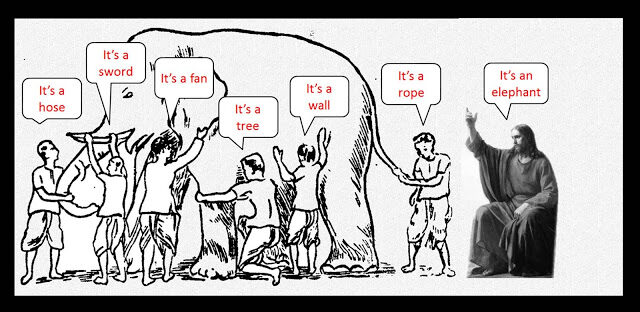You may have heard of the parable of the “Blind Men and the Elephant” with the exact opposite emphasis as that of the original.
If you have heard of it the emphasis was that just like blind men touching different parts of an elephant all come to different conclusions. This means, or so we are told, is meant to denote that there is no absolute truth, that everyone has their own equally valid opinion, that exclusivism is therefore wrong, etc., etc., etc.
One issue is that the parable has gone through various versions. Apparently, it originated in India and perhaps it did have the above noted connotation.
However, regardless of the original intention the fact is that reality is that which it is regardless. In fact, the concept of absolute truth is precisely this: reality is that which it is regardless of whether we agree with it or not, regardless of whether we like it or not, regardless of whether we prefer it be different or not, even regardless of whether we are aware of it or not.
Thus, John Godfrey Saxe’s (1816-1887 AD) version hits the nail on the heard:
It was six men of Indostan, To learning much inclined, Who went to see the Elephant (Though all of them were blind), That each by observation
Might satisfy his mind.
The First approach’d the Elephant, And happening to fall Against his broad and sturdy side, At once began to bawl: “God bless me! but the Elephant
Is very like a wall!”
The Second, feeling of the tusk, Cried, -“Ho! what have we here So very round and smooth and sharp? To me ’tis mighty clear, This wonder of an Elephant
Is very like a spear!”
The Third approach’d the animal, And happening to take The squirming trunk within his hands, Thus boldly up and spake: “I see,” -quoth he- “the Elephant
Is very like a snake!”
The Fourth reached out an eager hand, And felt about the knee: “What most this wondrous beast is like Is mighty plain,” -quoth he,- “‘Tis clear enough the Elephant
Is very like a tree!”
The Fifth, who chanced to touch the ear, Said- “E’en the blindest man Can tell what this resembles most; Deny the fact who can, This marvel of an Elephant
Is very like a fan!”
The Sixth no sooner had begun About the beast to grope, Then, seizing on the swinging tail That fell within his scope, “I see,” -quoth he,- “the Elephant Is very like a rope!” And so these men of Indostan Disputed loud and long, Each in his own opinion Exceeding stiff and strong, Though each was partly in the right,
And all were in the wrong!
MORAL,
So, oft in theologic wars The disputants, I ween, Rail on in utter ignorance Of what each other mean; And prate about an Elephant
Not one of them has seen!
Thus, of course it cannot be a parable about how there is no absolute truth, that everyone has their own equally valid opinion, that exclusivism is therefore wrong, etc., etc., etc. since the fact is that the elephant is an elephant and the blind men are basing their opinion of not having seen it and on not even feeling the entire elephant to which they had access, after all.

